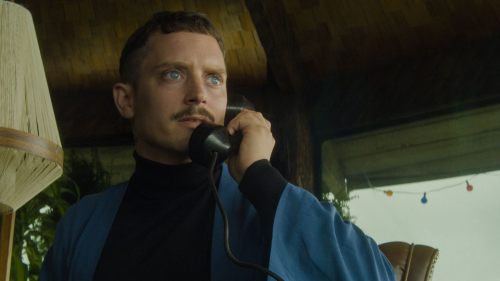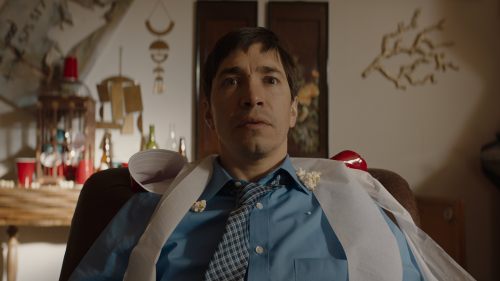Fantastic Fest Review: WORLD OF TOMORROW EPISODE 2 Will Rip Your Digital Soul
World of Tomorrow Episode 2: The Burden of Other People’s Thoughts is a sequel in all the best ways. It returns to the world of Don Hertzeldt’s original Academy Award nominated short, an animated film built around candid recordings of his four-year-old niece, expanding on its themes of identity in a future where human beings achieve immortality through cloning. The two-dimensional stick figures return here, as do the computer generated background effects and the voice actresses for Emily Prime (Winona Mae, now five) and a future, time-travelling Emily (Julia Pott) in a film that reveals a haunting obsession with understanding the concept of memory as it relates to digital media. It’s as beautiful and poignant as the first, perhaps even more so, and at a hair over 20 minutes long it manages to achieve what most sci-fi films fail to in several hours.
Emily Prime continues living life as usual, colouring away, blissfully unaware of the messy, complicated and existentially terrifying future in store for humanity despite it being explained to her by her future self. She’s visited from the future once again, albeit this time for a markedly different purpose. The last time around, a third-generation Emily clone returned from several centuries from now to retrieve a lost memory. This time, one of a dozen, partially rendered back-up clones of the future Emily makes her way to present day to meet with the original, a confused and unstable survivor of human extinction. This is Emily 6, raised mostly in isolation alongside a dozen other Emily back-ups, each fulfilling the purpose of a failsafe should the need arise to transfer Emily’s consciousness once again. Unlike the Emily clone from last time, this one is an incomplete person, prevented from living a full life but carrying the experiences and memories of her original; a life she never lived and one she may never get to live, but that is all she is allowed to be.
Emily 6 wants to be freed from other people’s thoughts. Through a process involving shared consciousness, she wants to separate her mind from that of Emily so she can finally be her own person, and she hopes the same for her sister Felicia (also an Emily backup, left floating in space), whose bracelet is the only memento she possesses. Emily 6 does not understand why she loves this bracelet, or what it means to her, or why. She doesn’t have the capacity or the function to process her emotions but her emotions are present no less, as Julia Pott imbues even her monotone expression with a sense of desperation, modulating speed and volume of her robotic speech whenever her emotions get overwhelming.
Instead of the Outer-Net, this time Emily Prime is dragged in to Emily 6’s very mind followed by her own, in an Inside Out-esque journey (both films were in production simultaneously, though the similarities are fascinating) that gives physical form to memories and emotions. What follows is the expected albeit emotionally riveting tale of Emily 6’s life, but as the film follows the two Emilys, it takes a few surprising stylistic turns that separate it from its predecessor in fascinating ways. The original’s dream-paintings return, the equalizer-esque digital representations of memories on canvas, only rather than museum exhibits they are now the texture of the film itself, as we travel deeper into their collective consciousness. Before we know it, gone are the sticks and circles underscoring the Emilys’ existence, replaced by cloud-tank practical effects and an overwhelming classical score, turning World of Tomorrow Episode 2 into an existential opera, as Emily Prime and Emily 6 soar through various realms of consciousness, from the flavourful abstracts of memory to the burial of orb-like glimmers of hope in the “bog of realism.”
Winona Mae’s recordings are much looser this time. They’re less reactionary and much more prone to stream-of-consciousness specificities. Hertzfeldt treats her as sort of a co-writer, and rather than molding a tangible narrative around the words themselves, he allows them to radiate outward, giving each object or funny animal or nonsensical shape-world a thematically coherent purpose within the jumble that is the Emilys’ mind. As we hop and skip through the mind of a child, so to do we experience the mind of her adult counterpart as she attempts to understand her own feelings as they relate to the world around her, a journey whose endpoint one might wonder about given that her objective is to reboot her mind.
Who will she be? Who is she now? Who are these digital imprints we leave behind? Who are we without them – and who will they be once we’re gone? None of these questions are asked of us explicitly, but they are at the forefront of Hertzfeldt’s latest, a thoughtful meditation on the very nuts & bolts that make up our consciousness, our experiences and our identity, parts of ourselves that are already transferable through social media, several hundred years ahead of Emily’s cloning process.
World of Tomorrow Episode 2: The Burden of Other People’s Thoughts is a vibrant sci-fi masterwork about the vast unknowables of the human mind at the root of the attachments that make us human, be it attachments to others or to our own sense of self. It’s also a sweet and intimate tale of finding simple companionship within dire circumstance, making its vast questions about humanity and all that we are all the more pressing. The only world in danger here is the one we create in our minds, housing all the things, people, feelings and concepts we can hold. Understanding it is as large and universal a stake as any, as is finding a way to do so in the now.



